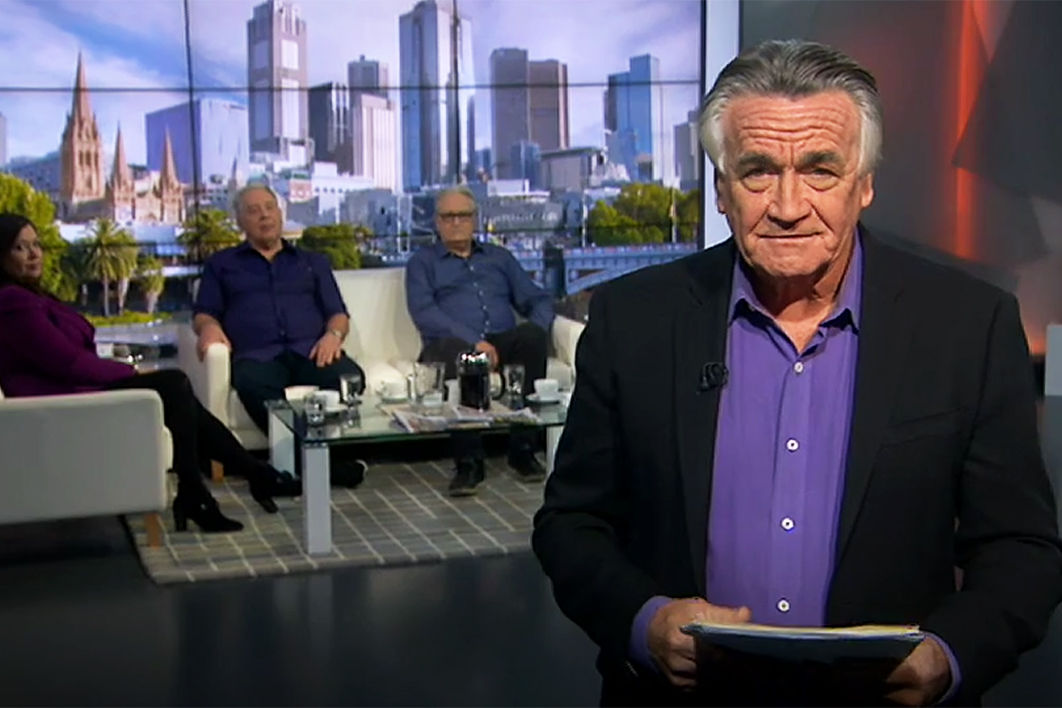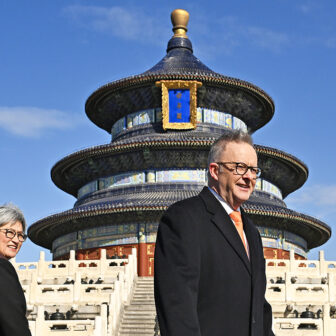When the cohort of guests and contributors who have been associated with ABC’s Insiders right through its eighteen-year history gathered to farewell Barrie Cassidy on Sunday, the spirit of collegiality and humour he has fostered was on show. Karen Middleton, Malcolm Farr and Dennis Atkins, panelists on the inaugural episode, provided the studio commentary, a Who’s Who of journalists and politicians featured in a collage of tributes, and the six prime ministers covered by Cassidy’s tenure appeared in a rapid succession of interview clips.
The prime ministers also featured as caricatures in the Talking Pictures retrospective presented by program regular Mike Bowers. Quick-fire visual editing and witty juxtaposition has been one of the hallmarks of Insiders. The program has given us the dramatis personae of the political world as miniaturised cartoon figures racing through a phantasmagoria, or as all-too-human personalities trapped in a chair by Cassidy’s steadily relentless questioning — or sometimes caught on camera during moments of flailing desperation, in what are badged “Matt Price moments.”
Cassidy was determined to share the honours of his own curtain call with an acknowledgement of Matt Price as a defining influence on the Insiders approach in its early years; Middleton described the late journalist as “garrulous, withering and hilarious.” But Cassidy’s own manner is much less confronting. “He could charm and disarm,” said Josh Frydenberg. “You would enter into a conversation on a Sunday morning without your tie,” and relax at your peril. Cassidy never interrupted; when he pulled off a gotcha moment, it was by deftly catching his subject off guard. Guests might have had memorable spats, but Cassidy managed to sustain an overall mood of ease that encouraged clarity rather than contentiousness.
Over his eighteen years as host, the program’s loyal audience has expanded steadily, even during periods when politics has been hard to watch. The stakes are so high, the issues so fraught and the dishonesty so persistent that many of us find television interviews and debates something of an ordeal. Somehow Cassidy’s presence served as an anchor in the true sense: as an embodiment of trust and stability amid the swirling tides of propaganda.
The debut episode of Insiders, on 15 July 2001, led with the story of the Aston by-election. The Liberals retained the seat with a reduced majority, but the votes they lost didn’t flow Labor’s way. Interviewed on the program, prime minister John Howard was keen to draw the inference that, contrary to the prevailing view of the commentariat, his government was on course to win a third term.
With all the apparent momentum on Labor’s side, the 2001 election played out in a way that was in some respects echoed last month. A 2 per cent swing to the government kept Howard in power, leaving those on the left of politics with a sense that public discourse was so thoroughly skewed by manipulation and misinformation that there was no hope of change through the democratic process.
But other factors were in play. That was the Tampa election, and it followed the chaos and trauma of the attacks on the World Trade Center in New York. Phillipa McGuinness’s recent book on 2001 as The Year Everything Changed portrays the gathering sense of an epoch turning, or rather churning, in dangerous and unpredictable ways.
Cassidy’s career included a period as press secretary to Bob Hawke during the most stable political period of the postwar era, but at the helm of Insiders he had to respond to a succession of profoundly disorienting events: the 9/11 attacks, the Iraq war, the global financial crisis, the dissemination of fake news, the ongoing climate crisis and the election of Trump.
Last weekend’s program led with the story of the Australian Federal Police raids on the ABC. They were intended “to send a message,” said Atkins, designed to intimidate journalists and media outlets. Cassidy interviewed deputy Labor leader Richard Marles, pressing him on why had Labor backed the legislation that set the framework for such an unequal balance of power between the press and the authorities.
It was classic Cassidy. Marles was vigorous in condemnation of the government’s assumed role in the raids, but gave a somewhat bland response on the key question of espionage laws and their impact on freedom of the press. Keeping the tone steady, Cassidy dug deeper rather than just reasserting his key challenge, as too many interviewers do when they think they are being tough. He gave viewers what was needed here — not a gotcha moment, but an exposure of how, on such a critical matter, when the role of the opposition as the guarantor of democracy is tested, the Labor position just doesn’t hang together.
There is widespread consensus that David Speers is a worthy successor to Cassidy on Insiders. He will take on the role at a time when the political and economic churning shows all the signs of leading to wider and more serious kinds of turbulence. Cassidy and Speers represent state-of-the-art approaches to political dialogue and commentary, but we may need something more than this, or something quite different, in the coming months and years. Rather than the endless commentary on the day-by-day, week-by-week cut and thrust of politics, it’s time to look at the underlying principles of government. No one is doing that. •




